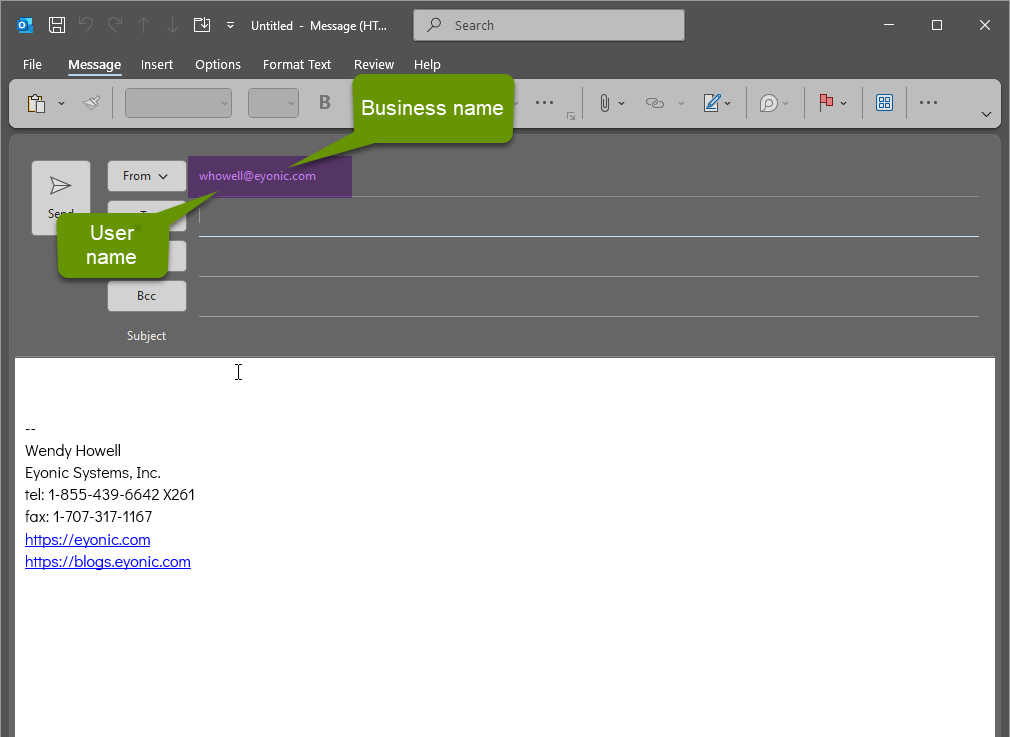3 Reasons Why Your Business Should Only Use Domain-Based Email
A domain is chosen by using the name of your business and adding .com, .org, .us, etc. to the end. For example, our business name is Eyonic Systems and our domain is eyonic.com. There are times when it makes sense to use something clever or shorter because the domain that matches your business is not available or impractical. If your business name has a complex spelling or is really lengthy, you might want to use something shorter or more succinct. Domain-based email is creating an email account that uses your business domain extension. Continuing our example above, user@eyonic.com would be the format for a business email account.
This post discusses the three reasons why your business should only use domain-based email.
3 Reasons Why Your Business Should Only Use Domain-Based Email
There are three main reasons why you should only use domain-based email for your business. These are:
Only you can create domain-based emails
The reason creating domain-based email is important, and why it is different, is because when you own a domain, you are the only person who can create domain-based emails. This is because creating domain-based emails requires you to prove you own the domain before you can finalize their creation. Contrarily, anyone can create email accounts that begin with a business name at free email services like Gmail, Hotmail, Outlook, Yahoo, etc.
Formatting of these email accounts looks like this:
- businessname@Yahoo.com - the business leads and the domain belongs to Yahoo.
- user@businessdomain.com - the business domain is at the end and the specific user or specialty comes first.

Sending emails to your clients and potential clients using a domain-based email ensures it is really you sending the emails. Domain-based emails add legitimacy to your business communications because they ensure with your client that you are in fact the sender.
If you use a free email account for your emails in the business@freeemail.com format, there is absolutely nothing that can stop someone from creating a secondary account using the same format at a different email provider and trying to send phishing emails to your client list. Sending via domain-based emails shows you are serious about your business AND your customer safety and privacy.
Forwarding or copying emails from staff who no longer work for you
When you have domain-based emails, you control the email accounts. You can have copies of incoming emails sent to certain accounts forwarded to additional accounts if necessary. This might be useful for trainees or interns. Also, if or when a staff person leaves your organization, they do not take that email account with them. Instead, you have options on how to manage that account so that client interactions are not lost. These include:
- Continue to access the email account using webmail or adding it to an email application like Outlook.
- Forward copies of the email account to another account so these emails can be monitored and followed up appropriately.
- Disable the account, but do not delete it, so you can access the legacy info at any time.
- Export the mailbox, save it and then import it into another mailbox.
There are several options available to you if an employee leaves when you own the mailbox. Most important of all is to immediately change the mailbox password once the person is no longer working for you so they cannot access it. Allowing them to access email when they no longer work for you is a huge security risk as they could send emails as if they still were working for you which could cause serious damage to your business reputation.
Creating aliases
The last reason you should only use domain-based emails for your business is so that you can easily create aliases that forward to staff for specialties like marketing, sales, support, help, licensing, contact, info, news, jobs, project, or other item that works for your business. Aliases help reduce the number of emails that are needed at a specific time and also allow multiple people to cover certain tasks easily.
Aliases are also free as they are not a real mailbox, but rather a pointer to other existing mailboxes. Replies are sent from the actual mailbox that replies so the original sender can continue to work with your staff until their needs have been met. Check out our recent blog post for additional information about when aliases are more appropriate for your business than additional email accounts.
Using domain-based emails for your business takes a little time to set up, but since only the owner of the domain can create domain-based email addresses, doing so increases the security and confidence to your customers in your emails. Additionally, if you ever need to, you can have copies of email going to certain users copied or forwarded to other users. Lastly, you can create aliases that allows multiple users to cover certain aspects of your business which increases timely responses to your clients.
As always, understanding the why behind this business choice is important because the cost of domain-based email is completely worth the security it provides.

